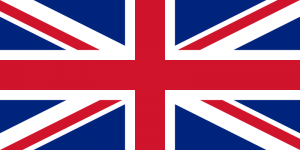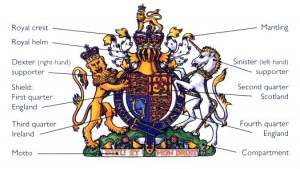Great Britain: General Facts
The United Kingdom of Great Britain and Northern Ireland is a country to the northwest of Europe. It consists of the island of Great Britain, the northeast part of the island of Ireland and many small islands. The largest island, Great Britain, is linked to France by the Channel Tunnel.
Historically, the country is divided into counties. At present, the four main administrative parts consist of regions and areas, which are subdivided into counties and districts.
The UK official flag is called the Union Flag or the Union Jack. It consists of the red cross of Saint George (the patron saint of England), edged in white, the diagonal red cross of Saint Patrick (the patron saint of Ireland) and the white diagonal cross of Saint Andrew (the patron saint of Scotland). The British Union Flag has the flags of Scotland, Northern Ireland and England, but does not have any Welsh representation. The Flag of Saint David is sometimes used as an alternative to the national flag and is flown on St. David’s Day.
The Royal Coat of Arms depicts the lions symbolizing England and the Monarchy, the chained Unicorn symbolizing Scotland and the Harp which is the emblem of Northern Ireland.
The motto of the UK is Dieu et mon droit (French) that means God and My Right.
God Save the Queen is the national anthem of the UK. In fact, it was a patriotic song, first performed in 1745. It became known as the national anthem at the beginning of the 19th century. The national anthem is played whenever the British monarch makes a public appearance. It is also played by the British Broadcasting Corporation (the BBC) every night before closedown. Besides, it is sung at the end of all important ceremonies, including football matches and other sports events.
GOD SAVE THE QUEEN
God save our gracious Queen,
Long live our noble Queen,
God save the Queen:
Send her victorious,
Happy and glorious,
Long to reign over us:
God save the Queen.
O Lord, our God, arise,
Scatter her enemies,
And make them fall.
Confound their politics,
Frustrate their knavish tricks,
On Thee our hopes we fix,
God save us all.
Thy choicest gifts in store,
On her be pleased to pour;
Long may she reign:
May she defend our laws,
And ever give us cause
To sing with heart and voice
God save the Queen.
When the monarch is a man, “Queen” is replaced by “King”.
The Statue of Britannia in Plymouth is the symbol of the UK.
The national bird of the UK is Robin Redbreast
ENGLAND
England: London is the capital. The English– an Englishman (woman); British English is the state language.
The national flower of England is the red rose. The flower has been adopted as England‟s emblem since the time of the Wars of the Roses, the civil wars (1455-1485) between the royal house of Lancaster (whose emblem was a red rose) and the royal house of York (whose emblem was a white rose).
SCOTLAND
Scotland: Edinburgh is the capital. The Scots = the Scottish and the Scotch: a Scotsman (woman) in English, a Scotchman (woman) in Scottish; British English is the state language, Scottish is the national language.
The Flag of Scotland, known as St. Andrew’s Cross, dates from the 9th century.
The national flower of Scotland is the thistle, which was first used in the 15th century as a symbol of defence. Scotland has several unofficial anthems.
WALES
Wales: Cardiff is the capital. The Welsh– a Welshman (woman); British English is the state language, Welsh is the national language.
The English name Wales originates from the Germanic word Walha, meaning foreigner. The Welsh call themselves Cymry and their country Cymru in Welsh, which mean compatriots.
Wales is often known by the phrase the Land of Song because its people are fond of singing, music and poetry. The principal Welsh festival of music and poetry is the National Eisteddfod, which takes place annually in a different town or city.
The national flower of Wales is the daffodil. The vegetable called leek is also a traditional emblem of Wales.
NORTHERN IRELAND
Northern Ireland (Ulster): Belfast is the capital. The Irish– an Irishman (woman); British English is the state language, Irish is the national language.
Northern Ireland consists of 26 districts. Together they are commonly called Ulster.
Some people call Ireland the Emerald Isle because the colour of the grass there is bright green.
The national flower of Northern Ireland is the shamrock, a plant with three heartshaped leaves (a three-leaf plant), similar to clover. An Irish tale tells of how Patrick used the three-leaf shamrock to explain the Trinity. He used it in his sermons to represent how the Father, the Son, and the Holy Spirit could all exist as separate elements of the same entity. St. Patrick’s Day is an official bank holiday in Northern Ireland.
The Currency and Economy of the UK
The currency of the UK is the pound sterling or the British sterling, represented by the symbol £. It is the third-largest currency after the U.S. dollar and the euro.
The Bank of England is the central bank of the UK, responsible for issuing currency.
The currency used at present
Coins: 1 penny, 2 pence, 5 pence, 10 pence, 50 pence, one pound, 2 pounds. All the coins carry the Queen‟s head on the front.
Notes: 5 pounds, 10 pounds, 20 pounds, 50 pounds.
On the 13th of March 2007, a new £20 note was issued by the Bank of England. The new note shows the image of Adam Smith (the 18th century economist), which makes him the first Scottish citizen on a UK banknote. However, the British monarch is depicted on the other banknotes. By the way, the £20 note is the most commonly used note nowadays.
The UK’s economy is made up of the economies of England, Scotland, Wales and Northern Ireland. Today the UK is the sixth largest economy in the world and the third largest in Europe after Germany and France.
Manufacturing is a significant part of the country’s economy. It includes the British motor industry (aerospace engines for civil and defence aircraft and Rolls-Royce) and the chemical and pharmaceutical industries.
The UK service sector is also highly developed. Financial services, especially in banking and insurance, form the biggest part of this sector.
Tourism is another important sphere of the British economy. The UK is the sixth major tourist country, and London is one of the most visited cities in the world.
The Religions in the UK
Christianity is the largest religion in the UK. About 21% of the people living in England, Scotland and Wales are Christians and belong to the Church of England. The second and the third most popular religions in the UK are Hinduism and Sikhism.
The Mass Media in the UK
The British national newspapers are daily newspapers (dailies), published on week days, and Sunday newspapers. Both can be quality newspapers, that cover serious home and foreign news and express the official political opinion, and popular newspapers (populars), whose main aim is shocking and personal stories, scandal and sport.
The quality papers are The Times (the oldest and the most important), The Guardian, The Daily Telegraph, The Financial Times, The Independent, The Observer, The Sunday Correspondent. The popular press includes Daily Mail, Daily Express, Sunday Express, Daily Mirror, Sunday Mirror, News of the World, The People.
The national radio and TV in the United Kingdom are controlled by the British Broadcasting Corporation (the BBC) and the Independent Television Commission (the ITC). The BBC is financed by the government, and it is the main television and radio broadcasting organization, which has five radio stations and two national TV channels. The ITC is responsible for the private companies.
The British TV and radio programmes are, as a rule, of a very high standard. But some people are worried about the amount of violence shown on TV and its effect on the young.
Top of the Pops is a musical programme, that is shown on the BBC TV every week. The producers of this show choose the songs and the bands which have sold the most copies weekly and may become hits. At the end of the show the disc jockey (DJ) also announces which song is the number one single.


